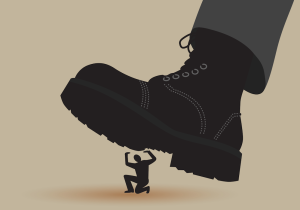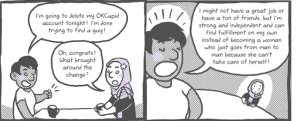
Source: Centric TV
I’m noticing a trend lately — over the past couple of years especially — where we feminists really want to get dudes on board.
“Come on, guys,” we’re collectively calling. “It’s time to get your shit together.”
Based on the countless outlets and publications I’ve seen boasting headlines along the lines of “10 Really Awesome Feminist Guys You Should Follow on Twitter” and “20 Ways to Be a Super Cool Feminist Man,” I get the impression that we’re fed up with the microaggressions committed against us on the daily and want to show how fun being on the right side of social change can be.
And all right. I’m into it.
But I’m a little concerned about how inaccessible a lot of these pieces tend to be.
Because they’re either sarcastic – and I love me some sarcasm; I just don’t think it’s the best educational tool – or they’re larger than life, exploring big-name activists with a lot of social capital who don’t really need more exposure in the first place. I’m pretty sure no Average Joe is going to read about change makers like Jackson Katz or Ta-Nehisi Coates and go, “Oh yeah. I can do that.”
When we favor covering the sensational work that feminist men are doing out there, I think we’re accidentally skipping over the “every man” and the simple, seemingly mundane ways that sexism creeps into our everyday lives.
So here’s a short introduction, guys.
Here are five simple things you should probably stop doing if you want to show that you have respect for women and actually see them as your equals.
1. Stop Mansplaining
Recently, a friend of mine who was fed up with having her own life experiences invalidated by men posted an article on Facebook about the phenomenon of mansplaining.
Within minutes, this gem of a comment popped up from a male friend: “I really don’t think this happens as often as you think it does.”
Cue side-eye.
In reality: Cue my commenting quickly, “You just did it.”
Mansplaining is a simple concept: It’s when men explain things to women in regards to the women’s own expertise or lived experiences – as if the men know more about the women’s own lives than the women themselves.
It’s when a guy was recently all up in my Twitter mentions, explaining body image and media literacy to me, when those two topics encompass most of what I do. It’s when men tell me how to feel about street harassment. I mean, it’s just a harmless whistle after all, right? Right?
It’s when a bunch of my Latina feminist friends were having a conversation on my Facebook page about their experiences with the wage gap, and a male friend of mine popped in to add his two cents – playing Devil’s Advocate, don’t you know – about how he once talked to a professor about this when he was studying Finance in undergrad, and it’s all being blown out of proportion, “according to studies” and all.
And, oftentimes, it’s when we assert that no, actually, we do know what we’re talking about, and suddenly we’re bitchy and irrational. For standing up for our own intellect and truth.
Sometimes I need things explained to me. And if you can help me out in that endeavor and I welcome it, then by all means, I’m listening and appreciative.
But have more faith in women, fellas.
We’re smart and articulate, too.
2. Stop Using Diminutives
The other day, I was giving a workshop on teen dating violence and sexual harassment to a group of teachers, and as I was leaving, one of the few men in the room reached out to shake my hand.
“It was a pleasure,” I told him, remembering – as I always do, but especially with men – to keep my handshake firm.
“Thanks so much, hun,” he said.
“Hun?” I was near-stunned.
It’s like when someone I just met calls me “Meliss.”
Excuse me? How dare you use this very familiar, only-ever-really-used-by-my-family-and-close-friends form of my name when you’re practically a stranger?
It just makes me feel some type of way.
And while I’m not dismissing diminutives outright – I honestly have this weird fantasy of finding a partner who will call me Sugar – there’s something to be said about someone dismissing your professionalism and expertise by using a word probably often reserved for little sisters.
And I get it.
While cutesy nicknames are often used purposely to knock women (or anyone, really) down a few pegs, usually they’re not intended to do harm. Hell, my dad uses “honey” and “sweetheart” all the time, whether he’s talking to me, my friends, or his waitress. But my dad is also 62.
At the end of the day, what matters here is your impact. If what comes across to me is that you think of me as cute and little – that is, less than – then your good intentions in an attempt at friendliness don’t really matter too much.
In short: If I’m not your pet (which, you know, I’m not), don’t use a pet name to refer to me.
Because, seriously, would you ever use “hun” to refer to one of your male colleagues?
3. Stop Asking for Education
I’m an educator. Literally. That is my job title.
And besides doing it for a living, I also do it as somewhat of a hobby – either that, or I just don’t know how to shut it off – especially on the Internet. I write articles. I make YouTube videos. I engage with folks on Twitter and Tumblr. I’m a lifelong learner, and I appreciate others who are, too.
But when you show up in my notifications like “Can you explain to me how cultural appropriation is racist?” my response is going to be along the lines of “Let me Google that for you.”
Because guess what. To quote X-Files: The truth is out there.
And when you ask me to spend my precious time giving you a 101 on a 101, you’re exercising your male entitlement. Like whoa.
I hate to break it to you, but women don’t owe you—well—anything. And we certainly don’t owe you our time and energy to explain to you concepts that we, more than likely, self-taught ourselves through researching the same magical resources that are available to you – like the Internet and libraries.
“I’m just trying to learn, though.”
I hear you. And I appreciate that. I want you to learn.
All I’m saying is that it isn’t my duty to teach you.
Putting in a little bit of effort to find the answers before asking experts to give you a one-on-one lesson in oppression would go a long way in showing me that you actually care about the topic at hand – and my time.
4. Stop Staying Silent
Up until recently, I had a male partner who worked the overnight shift in logistics at a furniture store. Essentially, this means that he’d get up at 2:00 in the morning (waking me up in the process, of course), and then go spend eight hours in a warehouse, restocking shelves with the incoming inventory.
And he had one asshole of a co-worker.
This guy would ask my then-partner at least weekly questions like “What do you think of the new girl?” and, when female co-workers passed, “Would you hit that?”
And he complained to me about it all the time.
“You should say something,” I would always answer. “Just tell him that this makes you uncomfortable.”
Or, I would suggest, talk to a manager about it since it constitutes workplace sexual harassment, which is entirely illegal.
Incredibly shy by nature and averse to confrontation, I don’t think that he ever did speak up. But I wish he would have. Because now this guy is going around thinking that that’s just how men talk to one another – and I’m sure that many others engage with him on this level, further solidifying his socialization.
And now, listen.
Yes. I’ve read Michael Kimmel’s Guyland (and if you haven’t, you should). I understand the concept of the culture of silence that shrouds men’s experiences, making it difficult for them to speak openly about their own emotions or, worse still, point out when other guys are doing something wrong (it goes against the Bro Code, I hear).
But here’s the thing: If your friend says something screwed up, say something.
Because he clearly needs to hear it, and he needs to hear it from you.
I know that women are probably (hopefully) calling him out, but that’s the nature of oppression my friend: A person in power (like a man) isn’t as likely to listen to a person not-in-power (like a woman) as he would be to someone he perceives to be more “on his level” (like another man).
And there’s even educational theory to back this up: Self-efficacy includes a tenet about the value of seeing people who look like you doing the thing you’re needing to learn to do. It makes you think, “Oh. If they can do it, then maybe I can do it.”
Be that guy.
5. Stop Trying to Prove How ‘Not Like That’ You Are
I dedicate this one especially – especially – to the Already Self-Identified Feminist Guys out there. Because this is something that I see y’all doing more often than other men.
And no, I’m not talking about the #NotAllMen frenzy that fuels men’s protests that “Okay, so one guy raped you, but not all guys are rapists,” as if that’s ever what we’re insinuating in the first place.
I’m talking about the one straight white cis guy who comes to my birthday party, sitting amid people with intersecting marginalized identities who keeps reminding us that he knows that he’s a straight white cis guy sitting amid people with intersecting marginalized identities – that he knows his place, that he understands oppressive structures, that he can (haha!) joke about what those other straight white cis guys do and say that are so offensive – uhh, effectively dominating the conversation.
As is often pointed out in social justice circles: If you’re not the problem, then you’re not the problem. You don’t need to point it out to us or defend others of you who aren’t terrible human beings.
Actions, as they say, speak louder than words.
You don’t have to apologize “on behalf” of your gender. You don’t have to show us how “with it” you are in terms of social justice jargon. You don’t have to join in on our griping or even our joking.
Just do you.
Because being a feminist man – really, truly a feminist man – is the best thing you can be, in my opinion.
***
Socialization is hard, y’all.
We’re all unlearning, relearning, deconstructing, and constructing meaning. We’re all trying to figure out how to be better people and work toward a healthier future.
That is to say: We’re all screwing up.
But if there are a few easy, small things you can do to show more respect to a group that you hold social power over, then do them.
We all have to start somewhere.
[do_widget id=”text-101″]
Melissa A. Fabello is the Co-Managing Editor of Everyday Feminism. She’s also a domestic violence prevention and sexuality educator, eating disorder and body image activist, and media literacy vlogger based out of Philadelphia. She enjoys rainy days, Jurassic Park, and the occasional Taylor Swift song and can be found on YouTube and Tumblr. She holds a B.S. in English Education from Boston University and an M.Ed. in Human Sexuality from Widener University. She is currently working on her PhD. She can be reached on Twitter @fyeahmfabello. Read her articles here and book her for speaking engagements here.
Search our 3000+ articles!
Read our articles about:
Our online racial justice training
Used by hundreds of universities, non-profits, and businesses.
Click to learn more




















